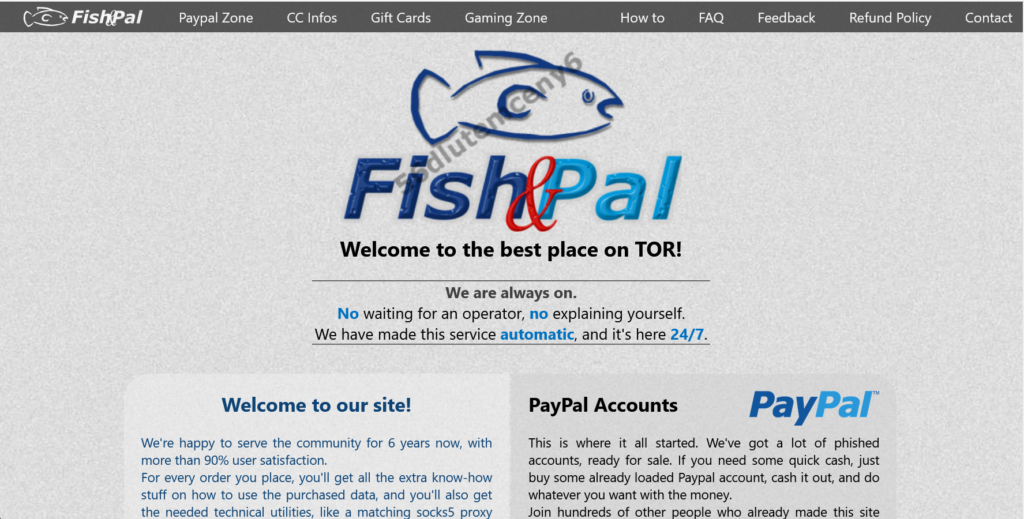Table of Contents
ToggleFishn’pal – TOR Scam Report (7)
Onion Link: http://56dlutemceny6ncaxolpn6lety2cqfz5fd64nx4ohevj4a7ricixwzad.onion/
Scam Report Date: 2023/09/21
Client Scam Report Breakdown
Original Report Summary:
User’s Experience and Initial Suspicion
The client purchased a PayPal account for $86 from the mentioned TOR-based website, only to find they never received the account. This experience hints at the site’s fraudulent nature, which is somewhat corroborated by the user’s observation that the website repeatedly lists the same few credit cards for sale. This repetitive listing should have been a red flag indicating the site’s potential scam operations. The promise of “quick cash” through phished PayPal accounts that are purportedly loaded and ready for cash-out creates an illusion of easy money, which lures unsuspecting buyers. The absence of delivery, despite the payment, signifies a breach of trust and a likely scam.
False Promises and Security Risks
The site offers various illegal goods, including PayPal accounts, full credit card information, and gift cards at a fraction of their original prices. The services claim to provide not just the data but also the necessary technical utilities and instructions for cashing out, further enticing potential victims with the promise of simplicity and security. However, these services are inherently risky and illegal, involving stolen financial information that can lead to severe legal consequences for buyers. The allure of easily obtainable goods and money masks the reality of potential fraud, identity theft, and legal issues that buyers may face. The website’s claim of 24/7 automatic service and high customer satisfaction is likely a facade to build trust and encourage more purchases, masking its true fraudulent nature.
Analysis of Common Red Flags and Terminology
Several red flags are evident in the client’s report and the site’s description. The repetitive listing of the same few cards is unusual for a legitimate service, indicating either a lack of actual inventory or a strategy to lure in more money without delivering goods. Terms like “phished accounts” and “full CC infos” (credit card information) refer to stolen data, obtained through phishing or other fraudulent means, which are then sold to buyers. “Matching socks5 proxy server” suggests the use of proxies to mask the buyer’s identity and location, a common tactic in illegal transactions. The promise of CRC (Cyclic Redundancy Check) matching codes indicates an attempt to reassure buyers of the legitimacy and functionality of the stolen data, despite its illicit origins. These elements collectively paint a picture of a sophisticated scam operation designed to exploit individuals seeking easy gains through illegal means.
Conclusion
The client’s experience highlights the deceptive nature of such websites operating on the darknet, exploiting the desire for quick and easy money. The failure to deliver the purchased PayPal account and the repetitive listing of items indicate a fraudulent scheme rather than a legitimate service. The terminology and promises used by the site are designed to entice and reassure potential buyers, masking the inherent risks and illegality involved. This case underscores the importance of vigilance and skepticism when encountering offers that seem too good to be true, especially in the context of darknet markets where anonymity and fraud are rampant.







